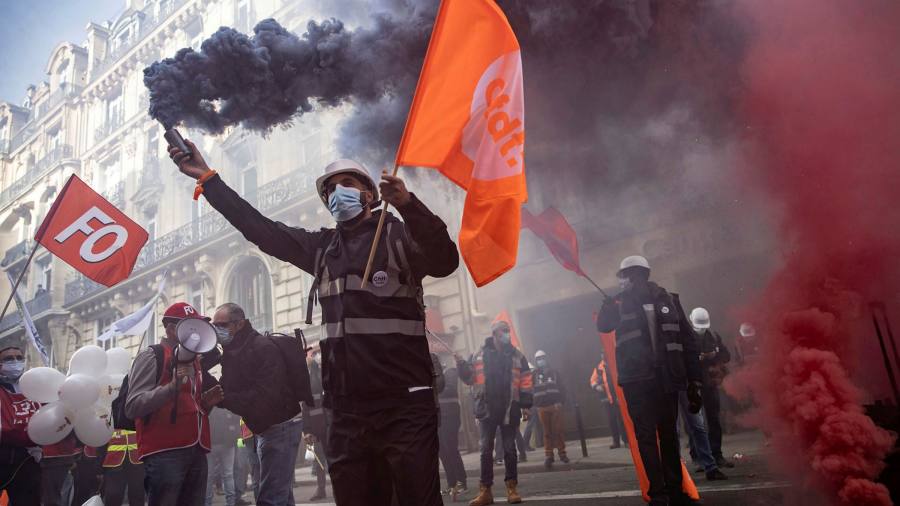[ad_1]
Pity Emmanuel Moulin. There can be few more dedicated civil servants than the 52-year-old director-general of the French Treasury.
He has demonstrated his mettle during successive crises — both subprime and eurozone — as a key adviser first to the former finance minister Christine Lagarde and then to ex-president Nicolas Sarkozy. But those challenges must have been a piece of cake compared with his latest task: trying to bring together the warring camps at the world’s two largest waste and water groups, Veolia and Suez.
Moulin was recently asked by the French finance minister to intervene as an informal peacemaker in the hostile bid battle between the two longtime rivals, which threatened to become a political embarrassment — and potentially a focus for industrial unrest. But not everyone wants to play.
Hostile bids for all or parts of a business are relatively rare in continental Europe. France has had just five since 2010, roughly on a par with Spain and Italy, according to Dealogic. So when they do happen, they tend to be fairly controversial.Â
Yet rarely has a French bid battle been as litigious as this one, say lawyers. Since Veolia bought a 29.9 per cent stake in its bitter rival Suez in October last year, some 12 cases and appeals have been brought before the French courts and one case before EU regulators.
Suez or its unions have challenged Veolia’s right to launch a bid, to vote its shares, and its handling of obligatory consultation with Suez employees. Veolia, meanwhile, is challenging Suez disposals and, most importantly, its decision to use an obscure Dutch law to ringfence its French water assets in a foundation whose board members would have veto rights over any disposal of the business.Â
It is this last that potentially has the greatest significance. The move, if activated by the Suez board, in effect blocks Veolia from being able to sell the French water business, a disposal regulators are expected to require should its bid be successful.
Stichtings, as these foundations are called, were first used in a takeover outside the Netherlands in 2006 when European steel group Arcelor was fighting tooth and nail to fend off a bid by India’s Mittal Steel.
Advised by law firm Skadden Arps Slate Meagher & Flom, Arcelor put its North American Dofasco steel business into Strategic Steel Stichting, barring the division’s sale as required by US regulators. Although Arcelor eventually succumbed to Mittal, the move gave the target time to rally support.Â
But these Dutch foundations are risky, as the merged ArcelorMittal discovered. When the group sought to sell Dofasco to Thyssenkrupp, the stichting’s independent directors refused. It took several years before ArcelorMittal was able to regain control.
Suez’s stichting could backfire too. The foundation’s directors do not take their orders from Suez, nor does the company own it.
Veolia has challenged the establishment of the stichting without shareholder approval and is threatening to vote against directors who created the foundation at Suez’s forthcoming annual meeting.
But a court ruling this month allowed Suez to maintain the stichting for up to four years, although the waters assets have not yet been transferred. A separate court case will decide the basic merits of Veolia’s case — whether the foundation is contrary to French law, which requires directors to safeguard corporate interests.
That ruling will take many months. It could define whether these instruments continue to be used in France. But even with an adverse ruling, it is not clear how a French ruling could lead to the unwinding of an entity already incorporated under a foreign law, say Paris-based lawyers.Â
People close to the situation suggest that Suez is unlikely to make its foundation irrevocable by transferring the assets, as some shareholders have denounced the poison pill. That would be seen as the ultimate act of hostility and could be used by Veolia to sue Suez directors, says one Paris lawyer.Â
That is a controversy that the government would like to avert.
Perhaps the most significant lesson from the battle is the impotence of the French state. In exchange for allowing Veolia to buy the Suez stake, the government insisted any approach should be friendly to avoid controversy in the year ahead of a presidential election. Yet this battle has been anything but. France may have reinforced its powers to fend off foreign bids last year. But when it comes to controlling its own, the state might just have to let this battle run its course.
[ad_2]
Source link





